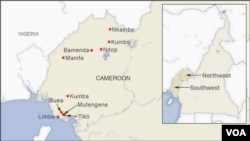Cameroonian rights groups have been providing food, clothing and medicine to 26 children authorities last week said they had rescued from traffickers in the English-speaking coastal town of Limbe. The groups are asking Cameroon’s government to immediately investigate and track child traffickers responsible for the abduction of the children from the crisis-prone western regions.
Sunday Several dozen women visited the police station in Limbe, a coastal city in Cameroon’s English-speaking Southwest region. Among them was Ngome Felicia Munge of the nongovernmental organization Southwest Women for Peace and Development Network. She says she is leading the group of women bringing gifts for 26 rescued children who have been at the police station for two weeks.
"Based on the situational analysis, the Southwest Women for Peace and Development Network decided to go and buy clothes, sanitary pads and Dettol [antibacterial] soap because they were having scabies. So, we brought their needs based on what they wanted. We fed them," she said.
Ngome said her group will continue providing assistance until the children leave the station. She said her group has not been told when the children will leave.
Cameroon police last week said they had intercepted a group of close to 30 children, ranging in age from 7 to 14 years in Limbe. The police said the children from Pondo Balue and Bafaka Balue, English-speaking southwestern villages, were being trafficked but gave no further details as to the destination of the children. Two women were arrested and accused of trafficking the children for financial benefit.
Local news organizations reported that the children were being trafficked to work as servants in French-speaking cities and towns.
Mokome Thaddeus says he is a spokesperson for the parents of the 26 children. He says villagers willfully handed the children over to women he said the villagers thought were well-wishers.
He says villagers held a meeting and decided to give their children to two women who pledged to take care of them. He says the two women from the city promised education for their children who, because of the separatist crisis, have been out of school for a long time.
Mokome said the villagers are unhappy because many of their children have not had any education for four years. He said a lot of the village girls have been raped by separatist fighters. He said many become pregnant at a young age.
The police said they were alerted when civilians saw the children crowded into a bus, with no food or water.
Beatrice Titanji is president of the rights group Womens Guild for Empowerment and Development. The group was created to deal with pressing issues concerning people displaced by the four-year separatist crisis in Cameroon’s western regions.
She says many parents have been sending their children out of the conflict zone, where they can be killed in fighting or are subject to violence and rape.
"The children actually were taken from their homes and the idea was that they were going to have better life in the city, and they would be able to go to school," she said. "After the interception the children were asked to go back to their homes if they wanted, but many of them refused to go [back to their homes]. But this is surely a situation of trafficking because when there is poverty, when there is hardship, many parents prefer to send their children to where they [the parents] think their children will have a better life, be able to go to school."
Titanji said investigations should be carried out into the networks responsible for trafficking the thousands of children who have been taken from the English-speaking regions to French-speaking towns to be sex workers or domestic servants.
In 2020, Cameroonian authorities said they had dismantled a network of child traffickers operating into neighboring Nigeria, Gabon, Equatorial Guinea and Chad.
In January, Cameroon police said they had opened investigations into a network of traffickers who allegedly buy babies from the central African state to sell in the Democratic Republic of the Congo.
Anglophone separatists have been fighting to create an English-speaking state in the French dominated country since 2016. The United Nations says more than 3,000 people have been killed and close to 550,000 displaced in the conflict.
